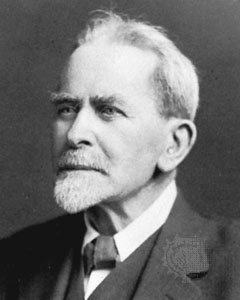James George Frazer
| Sir James George Frazer | |
|---|---|

Sir James George Frazer
|
|
| Born |
1 January 1854 Glasgow, Scotland, United Kingdom |
| Died | 7 May 1941 (aged 87) Cambridge, England, United Kingdom |
| Nationality | Scottish |
| Fields | Social anthropologist |
| Alma mater | University of Glasgow (MA 1874) |
| Known for | Research in mythology and comparative religion |
| Influenced | Jack Goody, Ross Nichols |
| Notable awards |
Order of Merit Fellow of the Royal Society |
Sir James George Frazer OM FRS FRSE FBA (/ˈfreɪzər/; 1 January 1854 – 7 May 1941) was a Scottish social anthropologist influential in the early stages of the modern studies of mythology and comparative religion. He is often considered one of the founding fathers of modern anthropology.
His most famous work, The Golden Bough (1890), documents and details the similarities among magical and religious beliefs around the globe. Frazer posited that human belief progressed through three stages: primitive magic, replaced by religion, in turn replaced by science.
He was born in Glasgow, Scotland, the son of Daniel F. Frazer, a chemist, and his wife, Katherine Brown.
Frazer attended school at Springfield Academy and Larchfield Academy in Helensburgh. He studied at the University of Glasgow and Trinity College, Cambridge, where he graduated with honours in Classics (his dissertation was published years later as The Growth of Plato's Ideal Theory) and remained a Classics Fellow all his life. From Trinity, he went on to study law at the Middle Temple, but never practised.
...
Wikipedia
